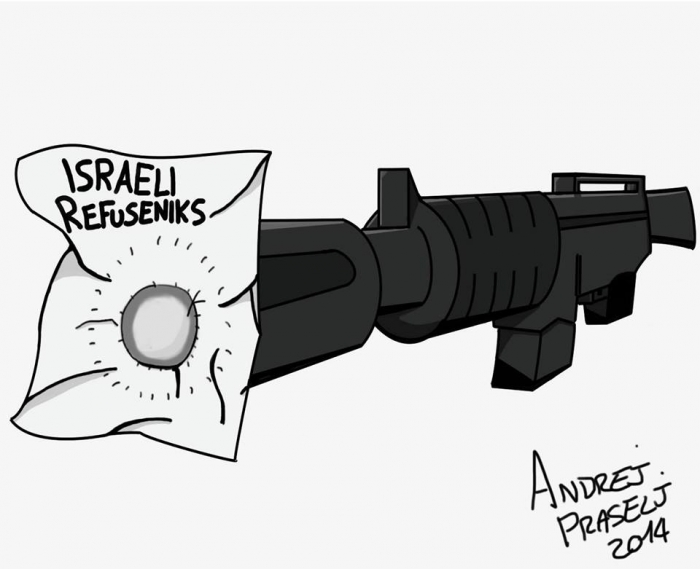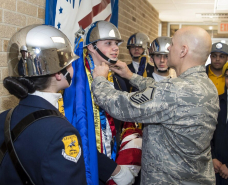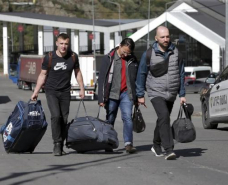A Call on IASA Alumni to Refuse Mandatory and Reserve Duty Service in the Israeli Military

We, Israel Arts and Science Academy alumni, former staff members, Palestinians and Jews, from different ages and diverse world-views, approach you, alumni and future alumni – dare to refuse.
As human beings and citizens we each carry responsibility for our choices and actions. Military service or refusing it is a choice. Refusing to serve in the Israeli military is not an easy choice, but a moral stance against a collective mood manifested in racism and violence on every street these days. It is a choice to withstand the pressure coming from one’s home, friends, professional environment and the media, and to not take part in the crimes done in our name. The refusal to serve means also resisting the militaristic indoctrination process we all went through since our childhood in schools, youth movements, national ceremonies, in high school – and which continues in our adult lives.
The Israeli military is responsible for the mundane systematic mechanisms of oppression used against Palestinians in the Occupied Territories while also taking part in the oppression and dispossession of the non-Jewish citizens of the State of Israel. The military serves as an enabler to a separation-regime based on the notion of an ethnic superiority of Jews over Palestinians; a regime which denies basic human rights, enforces separate legal systems to different populations in the West Bank, and which has institutionalized a system of ethnic-based discrimination in the ‘48 territory.
The fundamental questions surrounding military service are frequently silenced by equating refusing to serve with an opposition to the very existence of the state, deeming it therefore an irresponsible act which endangers our very physical existence. And we say to you: this is a demagogic silencing of your sense of justice and reason. Our human and civil duty is to be involved in our society and fix it. Refusal means voting with our feet against a policy that cannot be tolerated. Under a regime which negates any chance for diplomatic and social normalcy, which can ignore and squash sweeping social protest, refusal today is a brave and necessary act of civil resistance to unacceptable crimes. Today, after the most recent massacre in Gaza, a horror committed in our name against nearly two million people – half of whom are children and teenagers – we choose not to remain silent.
Oppression mechanisms are also used against Jews within Israel, particularly against Mizrachi, Ultra-Orthodox, Ethiopians, women, residents of the periphery and the poor wherever they are. The military is not the only executive power in the current political, social and economic reality, but a refusal to serve in it is a clear expression of resistance against these oppressions. Backed by the military, Israeli governments are exploiting the weakened populations for ethnic cleansing and dispossession projects across the Green Line, in the Negev and the Galilee, using them to fight the so called “demographic war”. The constant state of emergency serves the destructive neoliberal policy of the regime, which means the state’s rejection of its responsibility for its own citizens while eroding basic services such as health, welfare and education.
Refusing to serve is a privilege, demanding a difficult grappling with society, with the community and family, and sometimes even serving time in a military prison. When we were teenagers some of us did not have the knowledge, the courage or the proper networks of support to allow such an act, and we want you to know that there are voices like ours as well as different frameworks that support those who refuse or consider refusing.
You, the current students at the school, have led an inspiring struggle last year, aimed at improving the working conditions of contract workers there. This is one example of many effective forms of resistance to oppressive policies. Similarly, we believe that resistance by individuals through a refusal to serve the system can bring about a fundamental change in society and promote a social structure which is not based on the control of Jews over non-Jews in Israel.
From its inception to this day, the school’s administration boasts about the high quality of its education for leadership and excellence. Therefore, taking personal responsibility on your part and refusing Israel’s policy is all the more important. Use the critical tools and the rare experience of living in a school which brings together people from diverse ethnic groups and backgrounds to impact the society and the state in a positive way.
Yours,
Raya Rotem, former IASA teacher of literature, war widow
Raz Chen-Morris, former IASA teacher of history and a grade teacher
Nitzan Ofir, class of 1993
Almog Levin, class of 1993
Natalie Rothman, class of 1994
Ronnie Barkan, class of 1994
Anonymous, class of 1994
Aluma Klein, class of 1995
Fadi Shbita, class of 1995
Dana Abta, class of 1996, former IASA teacher of arts
Gilad Leibovich, class of 1996, former IASA class counselor
Ayelet McKyton, class of 1996, student thesis advisor
Rafi Avigad, class of 1996
Anonymous, class of 1996
Ghada Bshara, class of 1996
Na’ama Landau, class of 1996
Assaf Mahalalel, class of 1996
Anonymous, class of 1996
Anonymous, class of 1996
Mamdooh Afdile, class of 1998
Maya Maxwell, class of 1998
Udi Greenberg, class of 1998
Anonymous, class of 1998
Manal Ammouri, class of 2000
Danielle Shwartz, class of 2000
Gabriel Wolff, class of 2000
Odelia Hitron, class of 2001
Erga Sonnenberg, class of 2001
Saab Mansour, class of 2001
Amit Gilutz, class of 2001
Avital Reshef, class of 2001
Hana Amori, class of 2001
Yael Ben-Gigi, class of 2001
Liron Mor, class of 2001
Nir Baruch, class of 2001
Anonymous, class of 2001
Anonymous, class of 2001
Anonymous, class of 2001
Ela Gringauz, class of 2002
Jethro Brice, class of 2002
Ariel Yehuda Yahav, class of 2002
Noa Abend, class of 2002
Anonymous, class of 2002
Maisalon Dallashi, class of 2004
Adel Naamneh, class of 2004
Mai Sulieman, class of 2004
Eva Falah, class of 2004
Roi Hendel, class of 2004
Timna Raz, class of 2004
Inbal Djamchid, class of 2005
Yoni Balaban, class of 2005
Anonymous, class of 2005
Anonymous, class of 2005
Anonymous, class of 2005
Abed Shalabi, class of 2009
Anonymous, class of 2009
Anonymous, class of 2010
Maayan Shtendel, class of 2011
Anonymous, class of 2012
—
* The call in Hebrew uses both feminine and masculine interchangeably.
** Since the act of conscientious objection is regarded in a very negative way in the society we live in, some of us could not afford to expose their name at work, school or with the family and have therefore chosen to sign anonymously.
To join or for any consultation please contact us at: info@iasa-refuse.org or use the contact form.
Source: http://iasa-refuse.org/en/
Countering Military Recruitment

WRI's new booklet, Countering Military Recruitment: Learning the lessons of counter-recruitment campaigns internationally, is out now. The booklet includes examples of campaigning against youth militarisation across different countries with the contribution of grassroot activists.
You can order a paperback version here.








